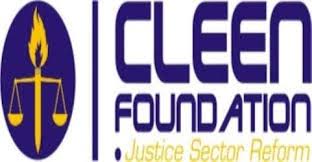CSI/Sustainability
CLEEN Foundation Mulls Long-Term Commitment, Others To Curb Challenges Of ACJL Implementation

By Samuel Luka, Bauchi
CLEEN foundation has observed that the persistent challenges confronting the Administration of Criminal Justice Law (ACJL) requires deeper institutional strengthening, broader stakeholder coordination, and long-term commitment to sustaining the reforms.
Executive Director of the foundation, Mr. Peter Maduoma stated this in Bauchi on Monday during a three-day workshop with the theme, “Institutional Strengthening For Civil Society Observatory Towards Sustainable Advocacy & Monitoring Implementation of the ACJL Regime in Nigeria”.
Represented by a senior information technology officer, Dr. Gabriel Akinremi, the Executive Director expressed delight that the collective efforts of CLEEN foundation and stakeholders in the justice system has yielded successes through advocacy, capacity building, policy reforms, and multi-stakeholder engagements.
He said over the past two years, the CLEEN Foundation, in collaboration with critical stakeholders across eight states, have been deeply engaged in promoting the effective implementation of the ACJA/ACJL.
Mr. Maduoma however noted that despite the achievements, challenges persists, particularly in ensuring consistent application, adequate training, and sustainable monitoring mechanisms for justice sector reforms.
He said: “this engagement provides us with an opportunity to reflect on our journey so far, share experiences, and develop strategic pathways that will consolidate our progress and ensure the long-term impact of our work”.
The Executive Director explained that the agenda for the meeting was carefully designed to equip civil society organizations, legal professionals, law enforcement agencies, and other critical actors with the tools, knowledge, and collaborative frameworks necessary to drive continuous reform efforts.
Mr. Maduoma enjoined the participants to actively participate, exchange insights, and contribute to shaping actionable recommendations that will strengthen justice sector oversight and enhance the sustainability of the ACJA/ACJL regime.
Also, highlighting some of the achievements recorded by ACJL Observatory Executives, Mr Mbami Iliya Sabka expressed delight that the intensive advocacy carried out by the Cleen foundation has made the authorities rise up to their responsibilities within the confines of the law.
The three day workshop themed: “Institutional Strengthening for Civil Society Observatory Towards Sustainable Advocacy & Monitoring Implementation of the ACJL Regime in Nigeria”, had Civil Society groups, Media practitioners, Lawyers, among others in attendance.
Mr. Sabka noted that active implementation of the Administration of Criminal Justice Law (ACJL) in Bauchi State has been largely attributed to strong stakeholder engagement and collaboration.
According to him, the effective. implementation of ACJL is essential to upholding the rights of individuals, ensure timely justice, and combat the systemic challenges in the justice sector.
He said to support the successful execution of the ACJL 2022, the Civil Society Observatory Group (BSCOG) was established in 2023 by CLEEN foundation with the goal of advocating for the law’s implementation and ensuring compliance among all stakeholders
Sabka added that the initiative aimed to address the challenges within the criminal justice system, highlight success stories, and identify lessons learned that will guide future actions for improving access to justice and promoting the rule of law.
Mr. Sabka pointed out that the observatory work involves regular audits, stakeholder engagements, and advocacy campaigns to influence policy changes and enhance the legal process, with a particular focus on ensuring the rights of marginalized and vulnerable groups, among others are protected within the criminal justice system.
He said despite the successes of the Civil Society Observatory Group (BSCOG), the project has been constrained by limited financial and human resources, adding that effective monitoring of the criminal justice system requires significant investment in logistics, staff, and technology, lack of which has sometimes hindered the ability to conduct comprehensive audits and advocacy activities.
